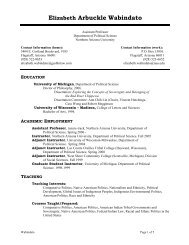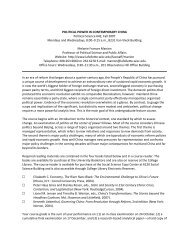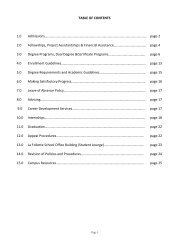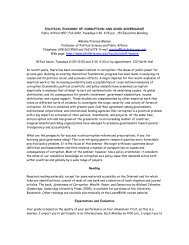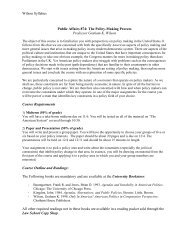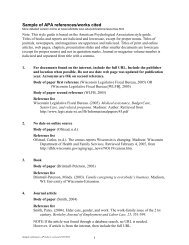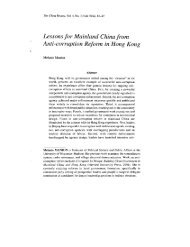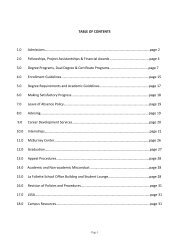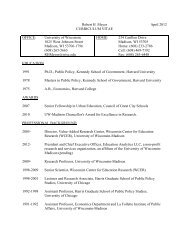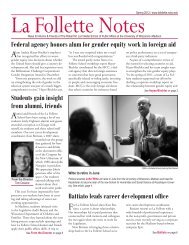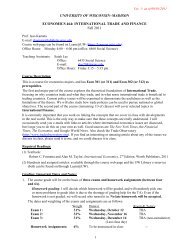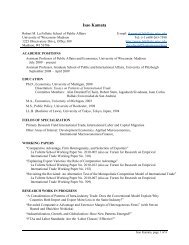SAVE Commission's findings - La Follette School of Public Affairs ...
SAVE Commission's findings - La Follette School of Public Affairs ...
SAVE Commission's findings - La Follette School of Public Affairs ...
Create successful ePaper yourself
Turn your PDF publications into a flip-book with our unique Google optimized e-Paper software.
CHAPTER<br />
FOUR<br />
20.13<br />
Decentralize personnel<br />
authority with<br />
accountability.<br />
20.14<br />
Reduce management<br />
layers.<br />
20.15<br />
Restore respect to<br />
public service work.<br />
20.16<br />
Reform total marketsensitive<br />
compensation<br />
to reward results and<br />
skills.<br />
20.17<br />
Maintain core<br />
competencies;<br />
otherwise invite<br />
competition.<br />
20.18<br />
All employees should<br />
contribute.<br />
20.19<br />
Institute a state<br />
government management<br />
model and<br />
common language.<br />
20.20<br />
Re-examine delivery <strong>of</strong><br />
certain state government<br />
services.<br />
20.21<br />
Contract out collective<br />
bargaining.<br />
Patricia A. Patros-<br />
Hanson, Eau Claire<br />
“The policy <strong>of</strong> an agency<br />
having to spend all<br />
funding allocated is<br />
idiotic.”<br />
workers and type <strong>of</strong> work needed. So<br />
job titles, working conditions and work<br />
itself will be for the people involved to<br />
decide, not a distant “specialist”. This<br />
means personnel authority, with accountability,<br />
will be decentralized to the<br />
lowest possible level.<br />
2. Have fewer management layers.<br />
Because employees will be treated more<br />
pr<strong>of</strong>essionally, fewer supervisors will be<br />
needed. Those middle mangers who<br />
remain will have the job <strong>of</strong> helping<br />
employees achieve, together, the mission<br />
<strong>of</strong> the organization based on<br />
performance standards and agreed upon<br />
results. Managers will be leaders, not<br />
controllers.<br />
3. Pay for skill and performance. If<br />
government employees are supposed to<br />
work smarter they need to be paid<br />
accordingly. Because the budget process<br />
will emphasize results, the workers will<br />
be paid for performance, individually or<br />
as members <strong>of</strong> a team. Poor performance,<br />
when it occurs, will similarly be<br />
addressed. Compensation will be<br />
competitive, taking into account total<br />
pay and benefits.<br />
4. Restore respect to public service.<br />
State employees believe they are not<br />
properly understood and their work is<br />
not appreciated. As the management<br />
system produces government<br />
scorecards, the value <strong>of</strong> public employees<br />
will become better known. In<br />
addition, a visible effort involving the<br />
state, unions and private enterprise<br />
should be considered.<br />
R E S U L T S<br />
Delivering a new management<br />
system will:<br />
1 Emphasize measurable results over<br />
meaningless process.<br />
2 Give the taxpayer more value for<br />
today’s dollar and today’s service.<br />
3 Eliminate $2 billion in waste in the<br />
existing civil service and<br />
management system from<br />
duplicative checking and distrust.<br />
4 Bring in the best management<br />
principles from the private sector,<br />
beginning with exhaustive pilot<br />
projects, chartered to produce<br />
measurable results in return for<br />
freedom from many rules,<br />
regulations and burdens that<br />
restrict other agencies.<br />
PROCUREMENT THAT DELIVERS<br />
VALUE<br />
Most state employees complain about<br />
purchasing practices that force them to use<br />
costly and time consuming paperwork and<br />
deny them the flexibility to buy what they need<br />
to do their work, even if it costs less.<br />
Procurement reforms will modernize the<br />
entire system, delegating to the lowest possible<br />
level the responsibility and authority to buy<br />
what’s needed to do the job, as long as the employee<br />
stays within budget. A new system <strong>of</strong><br />
legislative and executive oversight will need to<br />
be designed, but it should not be designed on<br />
the model <strong>of</strong> the current system, which micromanages.<br />
At the same time, employees should be<br />
equipped to become smart buyers. This is the<br />
new service role—as opposed to the existing<br />
controlling role—that will be played by procurement<br />
specialists in state government. In<br />
addition, the employees will become “buyers”<br />
<strong>of</strong> procurement services, requiring the procurement<br />
functions, for the most part, to compete<br />
for business within the state government system.<br />
Other key areas <strong>of</strong> reform include major<br />
changes in the way technology is purchased (the<br />
existing system makes it difficult to buy for<br />
value), increased use <strong>of</strong> partnerships and the<br />
use <strong>of</strong> “sunshine”—or open government reporting—as<br />
a tool insiders can use to do comparison<br />
shopping and outsiders can use to monitor<br />
costs.<br />
5 Reward employees for saving<br />
money.<br />
6 Change civil service by getting rid <strong>of</strong><br />
management layers, focusing on the<br />
mission <strong>of</strong> an agency and paying<br />
workers for skills and performance.<br />
7 Restore respect to public service.<br />
54 CITIZEN • COMMUNITY • GOVERNMENT — WISCONSIN: THE 21 ST CENTURY



